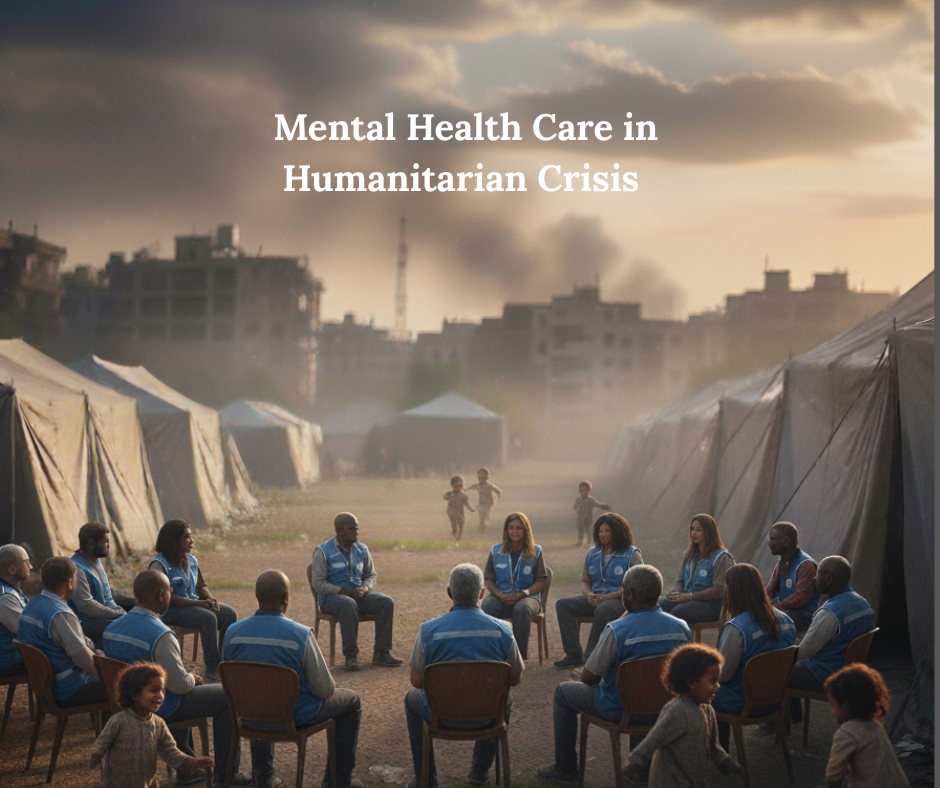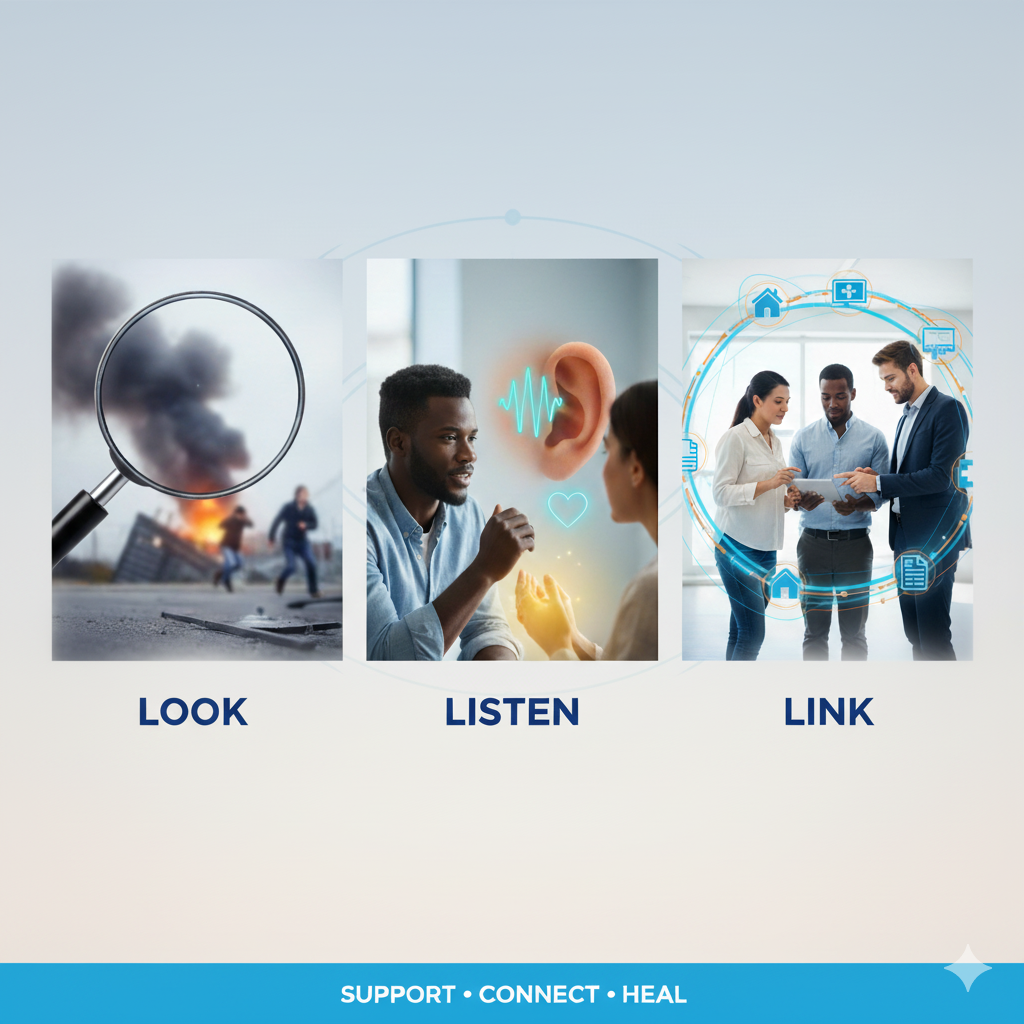Honouring Mental Health Awareness Month with the PsySSA Trauma and Violence Division (TVD)
The year’s theme, Mental Health in Humanitarian Crisis, reminds us that mental health care must remain at the heart of how we respond to trauma — both globally and locally.
- Thinking Local and Global
Lynne Richards highlights the Gift of the Givers Foundation — a beacon of hope integrating mental health support into humanitarian aid, ensuring care for both communities and volunteers on the front lines. - World Trauma Day – A Call to Highlight Psychological First Aid (PFA)
Lynne Richards and Leonie Vorster emphasise the growing importance of Psychological First Aid (PFA) — practical, compassionate support that helps individuals stabilise and recover following trauma.
Together, these contributions from the TVD Division remind us that psychological wellbeing, resilience, and community care must remain central to all humanitarian and recovery efforts. ????
Read more below:
“Thinking local and global – Gift of the Givers foundation at the forefront of mental health in humanitarian crisis”
The PsySSA Trauma and Violence Division (TVD) – Lynne Richards
Nationally, we celebrate Mental Health Awareness month each October, during which we highlight the need for public education and destigmatisation of mental illness. This year, the World Health Organisation’s theme for World Mental Health Day, celebrated on the 10th of October, was ‘ Mental Health in Humanitarian Crisis’. Within South Africa, there are numerous examples of organisations at the forefront of humanitarian aid; however, the Gift of the Givers Foundation is a beacon of hope for many. Lynne Richards, the chairperson of the Trauma and Violence Division, had the pleasure of interviewing Zohra Sooliman, Counseling Psychologist, Co-founder of the Gift of the Givers Foundation and Director of the Gift of the Givers Careline counselling services. Within this interview, Zohra discussed the integration of mental health services for their volunteers as well as within communities ravaged by disaster, natural or man-made.

The Gift of the Givers Foundation was founded in 1992 by Dr Imtiaz Sooliman and Zohra Sooliman. The organisation has intervened in various relief missions locally and globally. Zohra reported that she foresaw the impact of secondary traumatisation on the volunteer responders, including paramedics, medical doctors, and allied health workers. It was this knowledge that encouraged her to advocate for the addition of psychosocial support for their teams. This was the beginning of a commitment to ensuring mental health care and psychosocial support were a central pillar in disaster relief efforts. The organisation offers returning volunteers trauma debriefing, along with free counselling by a pool of volunteers. This ensures that their teams receive sustainable and ongoing support. Moreover, the organisation’s work extends to the provision of peer assistance and the upskilling of local professionals.
Through missions to Congo Brazzaville and Gaza in 2009, the organisation sought to collaborate with local psychologists and social workers and offered training to students in social work and psychology. The goal was to ensure that the community would be able to empower itself long after organisations retreated. This commitment ensures mental health support is sustainable. During local disasters, such as the floods and looting, the Foundation provided trauma debriefing and identified and provided free services to those in need.
In situations where circumstances prevent the deployment of relief teams, such as in the crisis in Gaza, the Foundation has sought innovative ways to provide support. Remote peer support is provided voluntarily by South African psychologists. This intervention aims to create meaningful connections. For example, psychological support was provided to Palestinian medical students who were hosted at South African Universities for the completion of their studies. Furthermore, the Foundation is collaborating with volunteers in Egypt to assist refugee committees with the aim of upskilling them in trauma-focused modalities such as Eye-Movement Desensitisation and Reprocessing (EMDR).
A key take-home message from the interview was highlighted: While basic needs such as clean water, nutrition, and medical services trump psychological services, it is essential to integrate psychosocial services into relief missions. Humanitarian crises call for novel approaches to mental health services, and the Gift of the Giver’s stands as an example of this.
“Word Trauma Day – A call to highlight Psychological First Aid following trauma”
The PsySSA Trauma and Violence Division (TVD) – Lynne Richards & Leonie Vorster
World Trauma Day, commemorated on 17 October, seeks to emphasise the importance of creating contexts in which people can recover and thrive following an incident of trauma (South African Government, 2025). Traumatic events or ‘Big T’ traumas are incidents which leave individuals vulnerable to negative psychological effects and trauma-based diagnoses (Gilmoor et al., 2019). Findings from the South Africa Stress and Health Study indicate that most South Africans experience at least one traumatic event during their lives, with many experiencing multiple traumatic events (Williams et al., 2007). With the mental health treatment gap increasing following the COVID-19 pandemic, the need for low-level interventions provided by cadres at a grassroots level to assist survivors of trauma remains.
Historically, trauma debriefing was encouraged following traumatic events, with many professionals and lay counsellors trained in this practice. However, research has provided no evidence of reduced mental health and the practice may even worsen mental health (Arancibia et al., 2022; Rose et al., 2002). Increasingly, Psychological First Aid (PFA) has been promoted as a suitable method for lay health workers and frontline workers to mitigate the impact of crises (Wang et al., 2021). According to the World Health Organisation (2011), PFS is described as ‘human, supportive and practical help to fellow human beings suffering a serious crisis event’.
PFA focuses on immediate, non-intrusive support and stabilisation of individuals in the immediate period following a crisis. The key principles of PFA include providing practical care and support following an assessment of an individual’s immediate needs. At its core, it involves using a person-centred approach to listening to the other without expecting them to talk or share their experience. Further, it encourages connecting people to information, services, and social support to ensure they are protected from further harm (World Health Organisation, 2011). The World Health Organisation manual expands on the Look, Listen and Link model (World Health Organisation, 2011).
Professionals within the field of psychology can play a larger role than the provision of the above service. Various organisations, including the World Health Organisation, provide manualised training which can be provided by facilitators, such as psychological practitioners, to upskill lay individuals within communities. This presents an opportunity for mental health professionals to create opportunities for social engagement and integration within the communities in which they live and work. Let us not miss this opportunity!
References
Arancibia, M., Leyton, F., Moran, J., Muga, A., Rios, U., Sepulveda, E., Vallejo-Correa, V. (2022). Psychological debriefing in acute traumatic events. Evidence synthesis. Medwave, 22(1), 002538. https://doi.org/10.5867/medwave.2022.01.002538
Gilmoor, A. R., Adithy, A. & Regeer, B. (2019). The cross-cultural validity of post-traumatic stress disorder and post-traumatic stress symptoms in the Indian context: A systematic search and review. Frontiers in Psychiatry, 4(10)439. https://doi.org/10.3389/fpsyt.2019.00439
Rose, S., Bisson, J., Churchill, R., & Wessely, S. (2002). [Psychological debriefing for preventing post traumatic stress disorder (PTSD). Cochrane Database Systematic Review,2, CD000560 https://doi.org/10.1002/14651858.CD000560
South African Government (2025). World Trauma Day. https://www.gov.za/world-trauma-day-1
Wang, L., Norman, I., Xiao, T., Li, Y. & Leamy, M. (2021). Psychological first aid training: A scoping review of its application, outcomes, and implementation. International Journal of Environmental Research and Public Health, 18(9), 4594. https://doi.org/10.3390/ijerph18094594
Williams, S., Williams, D., Stein, D., Seedat, S., Jackson, P., & Moomal, H. (2007). Multiple traumatic events and psychological distress: The South African Stress and Health Study. Journal of Traumatic Stress, 20(5), 845-855. https://doi.org/10.1002/jts.20252
World Health Organisation (2011). Psychological first aid: Guide for field workers. https://www.who.int/publications/i/item/9789241548205


Lynne Richards
Lynne Richards is a South African clinical psychologist. She earned her Master of Social Science in Clinical Psychology from the University of Kwazulu-Natal in 2024. Her clinical experience includes an internship at King Edward VIII Hospital and King Dinuzulu Hospital Complex in Durban. Lynne completed her community service year in the Umgungundlovu District, working at Fort Napier Hospital, a specialist psychiatric facility, and Harry Gwala Regional Hospital, serving a diverse community. She also provided community-level services at East Boom Community Health Centre. This experience deepened her interest in helping trauma survivors, especially children and adolescents dealing with difficult circumstances. Her postgraduate research examined how neglect is represented in psychological literature, reflecting her focus on often-overlooked trauma types. Currently, Lynne is the Chairperson of the Trauma and Violence Division (TVD) of the Psychological Society of South Africa (PsySSA), serving her second term. She is also a Project Manager at the KwaZulu-Natal Mental Health Advocacy Group, contributing to advocacy efforts.

Leonie Vorster
Leonie Vorster is dedicated to ensuring the effective and just use of ethically sourced, contextually relevant, and usable information. She actively promotes empowerment by seeking the furthest limits of the possible and imaginative to make a positive difference and inspiring others to do the same. Her core strengths include:
1) Generating and drawing on evidence-based insights to facilitate decision-making and to make organisations, products, and services work (or work better)
2) Finding the best secondary and primary information sources for co-creating usable insights
3) Writing about things that matter, editing information to ensure effective communication, and presenting information in a memorable way through effective design
4) Making strategic recommendations and advising regarding the integration of available information to ensure relevant, usable insights
5) Evaluating AI Large Language Model responses for the South African context
Leonie has successfully completed more than 400 research and research-based consulting assignments for government, semi-government, private, and not-for-profit clients based in more than 40 countries on five continents. Leonie’s commitment to professional excellence is legendary, and her passion for quality and ethical standards is unwavering.
She holds a BA Communication Science and BA Honours in Psychology from the University of Johannesburg, and a Masters in Research Psychology from Nelson Mandela University, and is registered at the Health Professions Council of South Africa as Research Psychologist.

